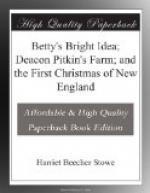No voice or sound from earth or sky proclaims that anything unwonted is coming or doing on these shores to-day. The wandering Indians, moving their hunting-camps along the woodland paths, saw no sign in the stars that morning, and no different color in the sunrise from what had been in the days of their fathers. Panther and wild-cat under their furry coats felt no thrill of coming dispossession, and saw nothing through their great golden eyes but the dawning of a day just like all other days—when “the sun ariseth and they gather themselves into their dens and lay them down.” And yet alike to Indian, panther, and wild-cat, to every oak of the forest, to every foot of land in America, from the stormy Atlantic to the broad Pacific, that day was a day of days.
There had been stormy and windy weather, but now dawned on the earth one of those still, golden times of November, full of dreamy rest and tender calm. The skies above were blue and fair, and the waters of the curving bay were a downward sky—a magical under-world, wherein the crimson oaks, and the dusk plumage of the pine, and the red holly-berries, and yellow sassafras leaves, all flickered and glinted in wavering bands of color as soft winds swayed the glassy floor of waters.
In a moment, there is heard in the silent bay a sound of a rush and ripple, different from the lap of the many-tongued waves on the shore; and, silently as a cloud, with white wings spread, a little vessel glides into the harbor.
A little craft is she—not larger than the fishing-smacks that ply their course along our coasts in summer; but her decks are crowded with men, women, and children, looking out with joyous curiosity on the beautiful bay, where, after many dangers and storms, they first have found safe shelter and hopeful harbor.
That small, unknown ship was the Mayflower; those men and women who crowded her decks were that little handful of God’s own wheat which had been flailed by adversity, tossed and winnowed till every husk of earthly selfishness and self-will had been beaten away from them and left only pure seed, fit for the planting of a new world. It was old Master Cotton Mather who said of them, “The Lord sifted three countries to find seed wherewith to plant America.”
Hark now to the hearty cry of the sailors, as with a plash and a cheer the anchor goes down, just in the deep water inside of Long Point; and then, says their journal, “being now passed the vast ocean and sea of troubles, before their preparation unto further proceedings as to seek out a place for habitation, they fell down on their knees and blessed the Lord, the God of heaven, who had brought them over the vast and furious ocean, and delivered them from all perils and miseries thereof.”
Let us draw nigh and mingle with this singular act of worship. Elder Brewster, with his well-worn Geneva Bible in hand, leads the thanksgiving in words which, though thousands of years old, seem as if written for the occasion of that hour:




